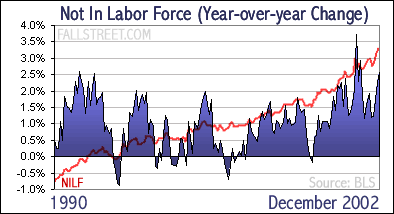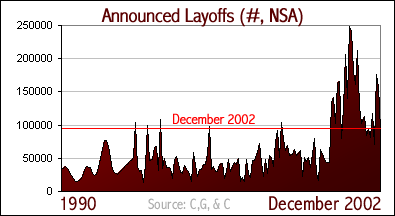February 3, 2002
Can Bush Rig-Up a Recovery By Plunge Protecting Stocks?
Secretary of State Colin Powell is scheduled to speak before the U.N. Security Council about Iraq on Wednesday. Given that Powell is expected to share new intelligence with the U.N., the markets, once again, will be watching Iraqi developments closely.
* The stock markets will rally when the Iraq situation is under control!
The above statement is not of much use to the investor. After all, the markets could rally when, and if, the U.S. attacks/defeats Iraq, but the markets could also crash before this takes place. Moreover, if the U.S. ‘goes it alone’ and/or an attack against Iraq does not progress quickly, is there not the possibility of a relief rally, a pause, then a plummet?
* Considering that every rally going forward will look like an ‘Iraq relief rally’, exactly when is the investor supposed to throw money at stocks?
Suffice it to say, it is difficult enough to pin down whether or not a single company, Heartland Express for example**, may be a good investment, let alone try to figure out whether or not the U.S. markets may be a speculative buy because geopolitical fears are about to ebb. In sum, Iraq developments are important for the U.S. and global financial markets; important but unpredictable.
Besides geopolitical developments, the markets will continue to respond to corporate earnings results and a steady flow of important economic reports due out this week.
Earnings Outlook Bleak
Last Friday First Call noted that ‘59% of the 332 companies that have issued first-quarter profit outlooks have warned about disappointing results compared with analysts' expectations.’ (LAT) And while most, including the Fed, are quick to point out that the lackluster outlook (for earnings and the economy) can be correlated to war/oil/geopolitical fears -- we prefer temporary explanations to a grimmer possibility -- it should be remembered that year-over-year earnings comparisons (1Q03-2Q03) were going to be difficult regardless of geopolitical tensions.
First Call reports that analysts are forecasting high single digit EPS comparisons in 1Q03 and 2Q03 (+10% in 1Q03), and double digit comparisons in the second half of the year. Standard and Poor’s is also anticipating that earnings growth will spike in the second half of 2003 (Excel), with quarterly operational earnings expected to progress by +4%, +16%, +21%, and +23% this year. Just like last year, the bulk of earnings growth is expected to arrive in the second half of the year.
To note: the S&P (operational) estimates are, essentially, what companies want to report. The ‘as reported’ figures and/or ‘core’ earnings figures, which are largely ignored by Wall Street (and First Call), could become more influential as the year progresses. One of the key components calculated in ‘core’ earnings are stock options.
Stock Options Battle Continues
Issued in October 1972 (before FASB was called FASB), Opinion 25 ‘specifies that stock-based employee compensation be recorded at the award’s intrinsic value at grant date for awards that meet certain criteria.’ More than 30 years later FASB is still trying to pass meaningful accounting changes from Opinion 25, which is now called Statement 123.
Before the comment period for Statement 123 ended, Nasdaq Vice Chairman Berkeley lashed out:
“Unable to unleash the creative power of their own economies, Europeans, particularly bureaucrats, are appalled at the willingness of American workers to accept low wages and willingly work 50 and 60 hours weeks in return for a sliver of ownership in their own business. Using "convergence of accounting standards" as a political grail, they plan to lower America to their own pitiful level of innovation and labor mobility.”
“The inability to own and accumulate productive assets is at the heart of the discontent that drives able-bodied people to street protest, guerilla warfare, and terrorism.”
Nasdaq Vice Chairman Berkeley
Perhaps someone should inform Mr. Berkeley that forcing companies to expense stock options would not stop companies from issuing stock options? Are Berkeley and many others simply arguing that the real costs of doing business in America should not be recorded as costs because this would impact earnings?
To reiterate (what the stock options problem is), a company issues employees stock options and when these options are exercised the company uses stock buy backs to absorb the dilution. What this does is allow companies to compensate employees without reporting any expense to shareholders -- many companies do not expense stock options when they are issued and cash used for buy backs is not expensed either. Shareholders are being deceived!
Will FASB have the guts to stand up to Berkekly, the IESOC, and numerous others?
Stock Options = Big Test for Herz
Since taking over as FASB Chairman last July, Herz has done many interesting things; his first orders of business was to argue ‘that his board alone would set all generally accepted accounting principles’, and that the U.S. should adopt principle based standards (Herz has the right idea about FASB being the sole partly to adopt new standards, but a principles-based approach requires people who have principles.)
Regardless of these directives, Herz’s first big test is likely to arrive with stock options. As Reuters notes, “Between July and October last year 128 companies announced they would deduct option costs from profits” (Reuters). By contrast, during November and December a total of 7 companies volunteered to expense stock options. What is becoming clear is that many companies, primarily tech, do not want to expense.
In sum, Herz wants stock options to be expensed. The power of the new FASB is going to be tested.
Economic Watch
|
The most important report due out this week is Friday’s employment report. However, given that the government (BLS) can sometimes tinker with the numbers (wink, wink), the initial employment numbers may not be as reliable as the longer-term revisions. Nevertheless one number to watch for the sake of amusement is the ‘Not in Labor Force’.
The BLS defines the NILF data as ‘a person who was neither employed nor unemployed’. However, the BLS also notes, ‘Even though persons not in the labor force are not actively looking for work, many might want to work under certain conditions.’ As for ‘discouraged workers’, which also fall under the NILF category, the BLS says ‘These are persons who say that they want a job, but are not looking for reasons related to the job market, such as "no work available," or "employers want someone younger".’
Suffice it to say, and using the BLS’s methodology, if enough American’s state that they are not looking for work because ‘no work available’ the unemployment rate could slide simply because more unemployed Americans have given up looking for work. In the government’s opinion, more ‘discouraged workers’ means a lower unemployment rate.
 |
As for layoff statistics, the BLS stopped calculating this data in November due to budget constraints. Challenger, Gray and Christmas numbers, like last weeks Help Wanted Index, have yet to suggest that an employment recovery is underway.
 |
The other key report due out this week is the ISM Index (later Today).
Rigging the Game?
In an attempt to combat slumping stock prices, last Friday The Financial Service Authority (FSA) said that it would grant waivers to insurance companies so that they would not be forced to sell stock shares to meet FSA solvency margin standards. What the FSA did not comment on, however, is the nightmare that would unfold if the reserve standards are lifted and stock prices continued to slump. Rather, when betting policy holder monies on stocks the FSA decided not to consider this possibility.
“One effect of the mechanics of the RMM approach is that it can put life insurance companies under pressure to sell equities (either outright or through derivative contracts) as equity prices fall, even though the firm may reasonably consider holding equities to be prudent and good value for policyholders in the longer term. There is a risk that these sales cause further falls which in turn trigger additional selling and a downward spiral in equity market prices.” FSA
Also last Friday, President Bush (reportedly) expanded his tax package by announcing new tax free savings and investment accounts. These new accounts, which would allow a certain amount of investment capital to be plowed into tax free accounts (tax free dividends, capital gains, etc), would immediately boost government tax credits (as people pay taxes on the other plans they would cash out) but dramatically reduce tax credits longer term (as people save/invest more money in tax free manner).
It is becoming increasingly clear that Bush’s plan to stimulate the economy is no longer focused on passing a check out to consumer and telling them to spend. Rather, Bush, whose most notable plan is not to tax corporate dividends, is attempting to change the entire tax structure of the U.S. financial markets. Why is Bush doing this? For one reason: so people are more likely to invest (hold onto) stocks.
Bush’s actions are a legal form of plunge protection (versus the ‘illegal’ or unreported actions of the Fed when they buy/sell futures or manipulate the price of gold). What is the legal brand of ‘plunge protection’? When current rules and regulations governing the stock markets are thought to be a threat to stock prices going forward, the rules are changed or new rules are created. For example, the FSA changes margin requirements for insurers, the Japanese Stock Buying Body directly purchases stocks, the SEC loosens capital requirements for mutual funds, the Nasdaq keeps penny stocks listed, and Bush tells people to invest tax free.
If all of his proposals pass (a BIG ‘if’), Bush could be successful in reigniting the U.S. stock markets this year. However, and knowing that the government already manipulates much of the data it reports (economic/deficit data), Bush’s plunge protection plans should be put into perspective: if the unemployment numbers are being rigged this is because the real numbers are awful -- if Bush is trying to rig the stock market this is because of the real threat that falling stock prices represent to the U.S. economy.
What is worth remembering is that none of Bush’s plans, or any plunge protection plans for that matter, guarantees that new capital will be shoveled into stocks.
** HTLD struck our reevaluation target last week. We are investigating HTLD for a possible investment.
|
|
All data and information within these pages is thought to be taken from reliable sources but there is no guarantee as such. All opinions expressed on this site are opinions and should not be regarded as investment advice.
Copyright © 2000, 2001, 2002
FallStreet.com